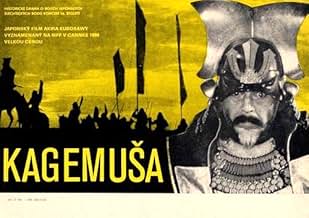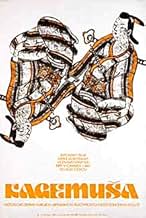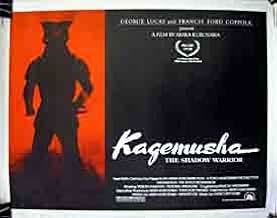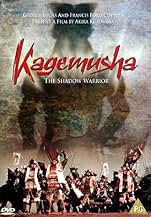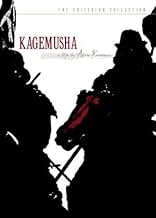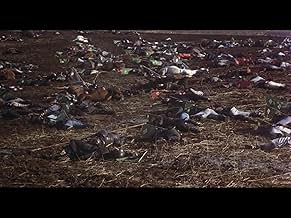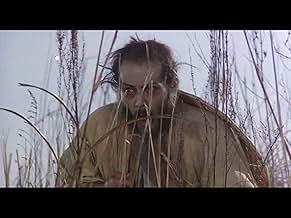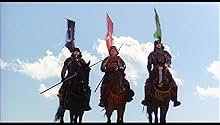IMDb RATING
7.9/10
40K
YOUR RATING
A petty thief with an utter resemblance to a samurai warlord is hired as the lord's double. When the warlord later dies the thief is forced to take up arms in his place.A petty thief with an utter resemblance to a samurai warlord is hired as the lord's double. When the warlord later dies the thief is forced to take up arms in his place.A petty thief with an utter resemblance to a samurai warlord is hired as the lord's double. When the warlord later dies the thief is forced to take up arms in his place.
- Director
- Writers
- Stars
- Nominated for 2 Oscars
- 20 wins & 5 nominations total
- Director
- Writers
- All cast & crew
- Production, box office & more at IMDbPro
Featured reviews
10Hitchcoc
This is a great epic of war and a film of great emotion. At the center is a man who has nothing. He is thrust into a world he didn't create. He is a petty thief and really would like to just get on with his life. What he also has is great loyalty to his now deceased lord, and despite his great concern for his ability to carry it off, he agrees to the position. He has to know that at some point this will all come crashing down. The Samurai code makes it so that he has few options. He runs the war the best he can but occasionally falls victim to who he is. Even with advisers watching his every move, he becomes so much a part of the entire picture that he is left to destroy himself, and, in the process, the clan that he represents. The battle scenes are remindful of the other huge films like "Ran" and "Throne of Blood." They sweep across the screen with the flag carrying horsemen and the infantry fighting until there is nothing left but total carnage. Because of the complexity of the story and the wonderful acting, I would put this at or near the top of my Kurosawa list.
I have seen nearly all of Akira Kurosawa's films, so my opinion shouldn't be completely ignored. Although I am in the distinct minority, I didn't particularly like KAGEMUSHA. Yes, it was big and beautiful and had great scope but it was also emotionally sterile and bore little resemblance to Kurosawa's earlier, more famous works. The same, by the way, can be said about RAN. Both films had relatively HUGE budgets but the dialog and connectedness between the characters was lacking. As a result, I felt pretty bored when I watched both of them--especially this film.
So, if you compare these two movies with THE 7 SAMURAI or YOJIMBO, for example, they seem VERY different. These older films, though not filmed in color, had a greater sense of humanity about them--great importance was placed on the INTERRELATIONSHIPS between the characters AND the camera work was very different, with more closeups and a more intimate feel. So, while RAN and KAGEMUSHA were pretty to look at, I felt much more detached from them and cared much less about the characters. I really think the problem with these two movies, and the reason I like them less than the average Kurosawa film, was that the big budget in these later films actually HURT them, as too much emphasis was placed on effects and dialog was purely secondary.
So, in summary, I am the odd-ball that didn't love this film. You will probably disagree and might be tempted to mark my review as "not helpful", as the reviews on IMDb are generally glowing. But having seen many Japanese films, I can't help but feel there are better films out there waiting to be seen. Most any other Kurosawa film, and films by other great directors (such as THE SAMURAI TRILOGY, the films of Yasujiro Ozu) are more appealing to me. I think the popularity of this film is in part due to its having been seen in theaters by more Westerners than any other of Kurosawa's films--SEEK OUT HIS EARLIER AND MID-CAREER FILMS--they are better and far more emotionally involving.
So, if you compare these two movies with THE 7 SAMURAI or YOJIMBO, for example, they seem VERY different. These older films, though not filmed in color, had a greater sense of humanity about them--great importance was placed on the INTERRELATIONSHIPS between the characters AND the camera work was very different, with more closeups and a more intimate feel. So, while RAN and KAGEMUSHA were pretty to look at, I felt much more detached from them and cared much less about the characters. I really think the problem with these two movies, and the reason I like them less than the average Kurosawa film, was that the big budget in these later films actually HURT them, as too much emphasis was placed on effects and dialog was purely secondary.
So, in summary, I am the odd-ball that didn't love this film. You will probably disagree and might be tempted to mark my review as "not helpful", as the reviews on IMDb are generally glowing. But having seen many Japanese films, I can't help but feel there are better films out there waiting to be seen. Most any other Kurosawa film, and films by other great directors (such as THE SAMURAI TRILOGY, the films of Yasujiro Ozu) are more appealing to me. I think the popularity of this film is in part due to its having been seen in theaters by more Westerners than any other of Kurosawa's films--SEEK OUT HIS EARLIER AND MID-CAREER FILMS--they are better and far more emotionally involving.
Akira Kurosawa is certainly one of the most important directors who ever lived. Most of his most famous films were made in the 50s and 60s. Rashomon, Ikiru, Yojimbo, and The Seven Samurai may be the four most famous films he made, and they were all in black and white. That format was wonderful. His films had a definitive look in that era.
I would like to suggest, though, that he was the single best director of the color image who has existed thus far (whose work I am familiar with). I have only seen two of his color films (I don't even know how many he made), this film and Ran, but his sense of color in these two films is exquisite. I had to pause it several times during Kagemusha just to stare at the beautiful composition.
I personally think that Kurosawa's talents rested mainly in the technical aspects of his films rather than the content (and I'm sure many people would argue against me here). So as for the film itself, I'd give it a 9/10 for two reasons. I was only emotionally involved during small sections of the film (the end was particularly powerful), and the story was somewhat difficult to follow (I was confused during Yojimbo and The Seven Samurai, too). I prefer Ran to this film (and to all the other films of his I've seen, which include Rashomon, The Seven Samurai, and Yojimbo). Still, Kagemusha is very good.
I would like to suggest, though, that he was the single best director of the color image who has existed thus far (whose work I am familiar with). I have only seen two of his color films (I don't even know how many he made), this film and Ran, but his sense of color in these two films is exquisite. I had to pause it several times during Kagemusha just to stare at the beautiful composition.
I personally think that Kurosawa's talents rested mainly in the technical aspects of his films rather than the content (and I'm sure many people would argue against me here). So as for the film itself, I'd give it a 9/10 for two reasons. I was only emotionally involved during small sections of the film (the end was particularly powerful), and the story was somewhat difficult to follow (I was confused during Yojimbo and The Seven Samurai, too). I prefer Ran to this film (and to all the other films of his I've seen, which include Rashomon, The Seven Samurai, and Yojimbo). Still, Kagemusha is very good.
10george-b
I am a fan of Kurosawa and have seen many of his films many times. There is a sweep and an ache to Kagemusha that is genuine and has remained in my heart's memory. Unlike Ran, it is not Shakespearean. Unlike Seven Samurai, my favorite all-time film and I believe the best film ever made, it is not a western.
Although epic, it is about a sweet and rueful soul swallowed by karma and history. It is redemptive without overt sentiment, and the lead performance by Tatsuya Nakadai is nuanced and unforgettable.
I will always remember this film, not for its complexity or savagery, but for the simplest moments between Lord and subject, between the highest self and the lowest self, and most particularly, the very real pain of a man caught in the vise of his own life and death.
Although epic, it is about a sweet and rueful soul swallowed by karma and history. It is redemptive without overt sentiment, and the lead performance by Tatsuya Nakadai is nuanced and unforgettable.
I will always remember this film, not for its complexity or savagery, but for the simplest moments between Lord and subject, between the highest self and the lowest self, and most particularly, the very real pain of a man caught in the vise of his own life and death.
I saw the director's cut about twenty years after I first saw the film. Kagemusha is as magnificent now as before, but what has changed in the meantime is my appreciation of the meaning of Shakespeare's plays. The history plays and most of the tragedies were about the political dilemmas facing the new Tudor state. The Elizabethan audience sat on the edge of their seats waiting to see how political order might be restored once it had been set in disarray. The Wars of the Roses sequence culminates in the late political tragedies -- Julius Caesar, Macbeth, Hamlet and Lear. The question is always the same. How is an impersonal modern state possible when its leader is a person, the King? Or is rule by office compatible with the human flaws of the person occupying it? Shakespeare was the client of a conservative aristocratic faction, no rabble-rousing democrat he. But he went so deep into this political question in the course of writing all his plays that he dug deeper into this core issue of modern politics than anyone since.
Kurosawa approaches the same question through the notion of a double,"the shadow of a warrior", Kagemusha. Here the contrast between the office of the political leader and its personal incumbent is brought vividly to life in so many ways. The period is the Japanese equivalent of England's War of the Roses, the transition from feudalism to the beginnings of the modern state. The losing side in this case is the one that tries to resolve the contradiction of personality and office by a subterfuge, a thief masquerading as a lord. The winning side and founder of the Japanese state is the Tokugawa clan. The climactic battle symbolises the passage from traditional to modern warfare, as the horses of the losers are mown down by fusillades of gunfire. The credits run as the corpse of the double crosses a submerged flag whose abstract symbolism shows us which aspects of feudalism the modern state will borrow. Personality is vanquished.
The aesthetic vision animating this movie is incredible. There is so much to look at and admire, perhaps interpret. One striking feature for me was the persistent strong breeze ripping through the banners, a symbol of the winds of change running through 16th century Japan, contemporary to Shakespeare's period. Because this drama was made by and for the modern cinema, in many ways Kurosawa's masterpiece is better than Shakespeare.
Kurosawa approaches the same question through the notion of a double,"the shadow of a warrior", Kagemusha. Here the contrast between the office of the political leader and its personal incumbent is brought vividly to life in so many ways. The period is the Japanese equivalent of England's War of the Roses, the transition from feudalism to the beginnings of the modern state. The losing side in this case is the one that tries to resolve the contradiction of personality and office by a subterfuge, a thief masquerading as a lord. The winning side and founder of the Japanese state is the Tokugawa clan. The climactic battle symbolises the passage from traditional to modern warfare, as the horses of the losers are mown down by fusillades of gunfire. The credits run as the corpse of the double crosses a submerged flag whose abstract symbolism shows us which aspects of feudalism the modern state will borrow. Personality is vanquished.
The aesthetic vision animating this movie is incredible. There is so much to look at and admire, perhaps interpret. One striking feature for me was the persistent strong breeze ripping through the banners, a symbol of the winds of change running through 16th century Japan, contemporary to Shakespeare's period. Because this drama was made by and for the modern cinema, in many ways Kurosawa's masterpiece is better than Shakespeare.
Did you know
- TriviaMuch of the film recounts actual historical events, including Shingen's death and the two-year secret, and the climactic Battle of Nagashino in 1575. Those scenes are also modeled closely on detailed accounts of the battle.
- GoofsIn the final battle there are at least 100 riflemen shown firing their matchlock rifles in volleys. The smoke generated by the matchlocks almost immediately dissipates. This indicates a more modern gunpowder was used in the matchlocks as the historically correct black powder load would blanket the battlefield with thick smoke after a handful of volleys.
- Quotes
Nobukado Takeda: The shadow of a man can never stand up and walk on its own.
- Alternate versionsIn the original Japanese version, there are 20 minutes featuring Kenshin Uesugi. For some reason, these scenes were cut out of the USA version.
- ConnectionsFeatured in A.K. (1985)
Details
- Release date
- Countries of origin
- Language
- Also known as
- Kagemusha - Director's Cut
- Filming locations
- Himeji Castle, Himeji, Japan(Nobunaga's castle)
- Production companies
- See more company credits at IMDbPro
Box office
- Budget
- $6,000,000 (estimated)
- Gross US & Canada
- $4,000,000
- Gross worldwide
- $4,018,532
- Runtime3 hours
- Color
- Sound mix
- 4-Track Stereo(original version)
- Aspect ratio
- 1.85 : 1
Contribute to this page
Suggest an edit or add missing content

Top Gap
By what name was Kagemusha, l'ombre du guerrier (1980) officially released in Canada in French?
Answer

